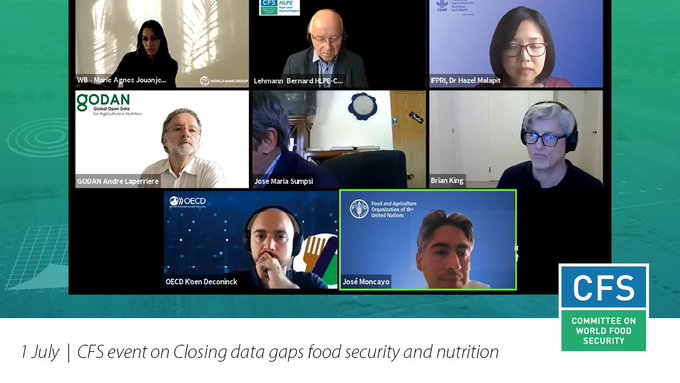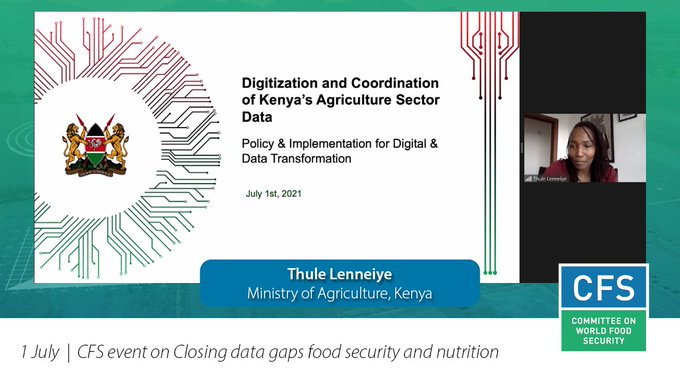1 July 2021. Closing Data Gaps and Promoting Evidence-Informed Decision-Making for Food Security and Nutrition. by CFS/FAO
The Secretariat of the Committee on World Food Security (CFS) is organizing a half-day public event in support of the CFS 2020-2023 Multi-year Program of Work (MYPOW), specifically its approved major work-stream on data systems related to global food security and nutrition.
This event was open to interested parties from the CFS and relevant institutions, including CFSMembers, (ad hoc) Advisory Group members, Civil Society and Private Sector Mechanisms associated with the Committee.
The event kick-started the process of policy convergence among CFS members and stakeholders, and it will assist the CFS High Level Panel of Experts (CFS HLPE) prepare their own anticipated report on this topic. It is foreseen that the outcomes of the webinar, drafted in the form of a Chair’s summary, will help frame and refine the scope and objectives of the CFS HLPE report which is expected to be released in 2022.
- For more information, read the concept note.
- Download the programme here.
- Download the biographies here.
Shared resources:
- CFS (2021) Policy Recommendations onClosing Data Gapsand PromotingEvidence-InformedDecision-Making inAgriculture. 2 pp.
- HLPE (2020) Food security and nutrition: building a global narrative towards 2030. A report by the High Level Panel of Experts on Food Security and Nutrition of the Committee on World Food Security, Rome. 112 pp.
- Solution Cluster 1.4.3 - Launch a Global Food Systems Data Consortium (Action Track 1 UNFSS)
Welcome remarks
- Introductory remarks by the CFS Chairperson Thanawat Tiensin
- Keynote Address: Can agriculture and food security policies be effective when data is unreliable? Making the case for more and better (food security and nutrition) data, Máximo Torero Cullen: FAO, Chief Economist
Panel 1: Promoting data collection and analysis for better food security and nutrition
- Harnessing the power of data for the transformation of the agrifood system, Marie-Agnès Jouanjean, World Bank Group, Economist;
- Overcoming evidence gaps on food systems, Koen Deconinck: OECD Trade and Agriculture Directorate, Economist/ Policy Analyst;
- The Women’s Empowerment in Agriculture Index: A suite of tools and methods for measuring empowerment and gender equality, Hazel Malapit: IFPRI, Senior Research Coordinator;
- New data sources and big data approaches to solve agricultural development problems faster, better and at a greater scale than before, Brian King: CGIAR Platform for Big Data in Agriculture, Coordinator;
- Responsible and Open Data for Agriculture and Nutrition, the promises and challenges. André Laperriere: Global Open Data for Agriculture and Nutrition (GODAN), Executive Director;
Panel 2: Use of data for increasing food and nutrition security and accelerating food systems transformation – country experiences/case studies
- More and better data for agriculture transformation in Kenya, Thule Lenneiye:Ministry of Agriculture, Director of the Agricultural Transformation Office;
- Smallholders’ data. Using participatory approaches for mapping of territorial markets, Nadjirou Sall: ROPPA, Secretary General ;
- Data in Action: An Open-Source Protocol for Securely Exchanging Agricultural Data, Rikin Gandhi: Digital Green, Executive Director;
- Who's digits in who's data? Pat Mooney: ETC Group, co-founder
Moderated discussion and conclusions
Moderated by Bernard Lehmann with concluding remarks by José Maria Sumpsi Viñas, both members of the CFS HLPE Steering Committee




No comments:
Post a Comment